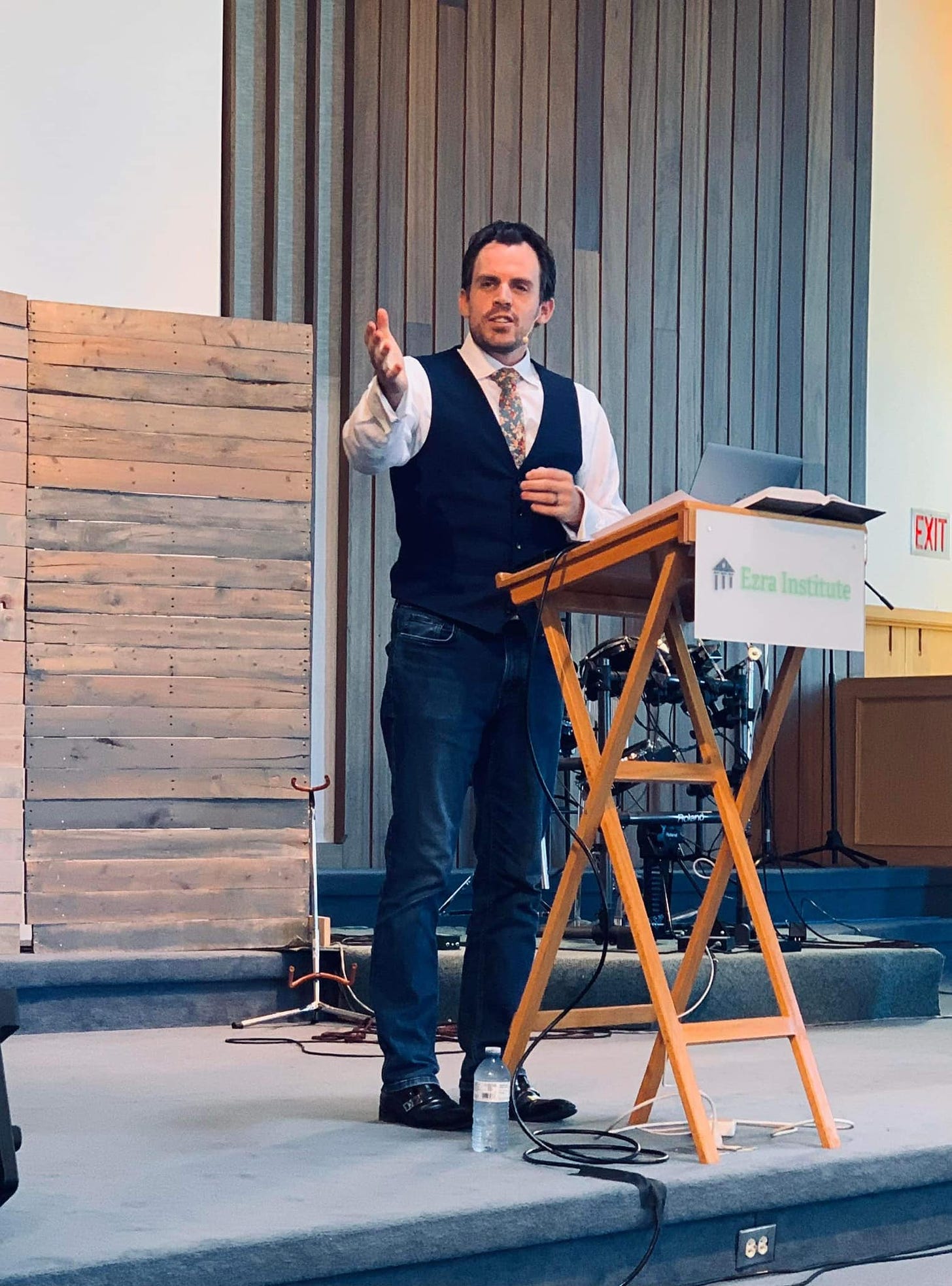
Scriptural Repulsion of “Same-Sex Attraction”
Creating a church environment safe for the self-satisfied, unrepentant same-sex attracted ( = tempted) is really a gateway drug to the practice of homosexuality.
Dear friends and supporters,
We are headed home after a nearly month’s travel to Montana and Canada. The final Canadian event was the Mission of God conference in Edmonton (see photos and listen to my lecture below).
I realize many are waiting eagerly for Failed Church: Restoring a Vision of Ecclesial Victory. It’s taken much longer than I’d hoped, but should be complete by July 1. It will be worth waiting for. This wide-ranging book by numerous gifted, prophetic writers addresses churchly failure on Covid lockdowns, social justice, kingdom commission, cancel culture, BLM and much else.
The release of my book Creational Marriage: Issues and Controversies was set to coincide with my and Sharon’s 40th wedding anniversary in August, but it will likely come later. This fall we hope to release Professor John M. Frame’s collected sermons Widen Your Hearts. My heavy travel and lecture and preaching schedule has cut into other important work. Thank you so much for your patience.
“Same-Sex Attraction”
The issue of what to do about “same-sex attraction” is live in even conservative churches and denominations. It’s an unprecedented issue. Even 25 years ago this topic would have been on no Christian group’s radar. It’s an issue with staying power. The wider erotic regime in our culture will make sure of that. It’s an unavoidable topic.
One way to clarify this issue is to contrast heterosexual desire to homosexual desire.
An Apology for “Heterosexual” and “Homosexual”
Before I do that, however, I need to apologize for employing the terms “heterosexual” and “homosexual.” Let me tell you why.
These are comparatively recent terms and are actually a concession to a harmful shift in the understanding of sex. In the Bible and all the rest of the ancient world, there were no homosexuals or heterosexuals. Of course, there were those called sodomites (for example), but this had a very different meaning from what we today term homosexual. It meant people who practice same-sex sodomy (and sexual acts between women).
Likewise, there were no heterosexuals. There were only people who engaged in opposite-sex intercourse, whether God-sanctioned (in marriage) or God-defying (outside marriage).
Today one’s sexual practice is assumed to be part of his identity. One’s choice of sex acts is seen as ontologically rooted as skin color or bone structure. To criticize another’s sexual acts is to assault his very identity.
This is a pernicious development, and the present erotic offensive would’ve been impossible apart from this weighted, innovative meaning attached to “heterosexual” and “homosexual.” I use those words, therefore, simply because they are common verbal coinage, not because they are my preferred words describing people’s specific acts of sexual intercourse.
Sinful and Non-Sinful Sexual Desire
The desire for heterosexual intercourse is not of itself sin: heterosexual intercourse is part of the created order, though of course it can be practiced (sinfully) outside God’s boundaries for marriage. If it is fueled by illicit thoughts, it is sinful lust. Heterosexual desire can be licit or illicit.
The difference between it and homosexual desire is that the latter cannot be legitimately fulfilled. If by desire we simply mean that one is tempted to lust, then that is not sin, because it is not a sin to be tempted (our Lord himself was tempted).
However, if we believe that sustained, unabated, unaddressed homosexual desires are permissible, we are certainly wrong, because those desires cannot legitimately be fulfilled. It is equally true that sustained, unabated, unaddressed heterosexual desires that, if fulfilled, would lead to fornication are wrong:
Let no one say when he is tempted, “I am tempted by God”; for God cannot be tempted by evil, nor does He Himself tempt anyone. But each one is tempted when he is drawn away by his own desires and enticed. Then, when desire has conceived, it gives birth to sin; and sin, when it is full-grown, brings forth death. (James 1:13–15, deemphasis supplied)
Sin occurs when we refuse to resist illicit desire. The external tug to sin is not sin. Refusing to tug away from it internally is.
The Concupiscence Conflict
The context of this debate is new, but the underlying issues are not. They surround the theological concept of concupiscence. Generically this word refers to desire, but theologically it denotes unruly bodily desires. The Roman Catholic Church teaches that concupiscence is the exclusive province of the bodily senses, as opposed to the mind and reason. The bodily desires are designed by God to be subordinate to reason, which relates man to God and to higher, spiritual things. Unfortunately, at the fall, these bodily desires were twisted and, if not resisted, can lead man to sin.
If you have a background in philosophy, all of this might sound vaguely familiar to you. Plato and other ancient Greeks saw the body as encasing in the soul, which is governed by reason. Reason is a higher faculty designed to keep the senses, and concupiscence, in check.
This idea isn’t remotely biblical. In the Bible, the bodily desires are in no way inherently inferior to the mind or reason, and the latter, as a result of the fall, are just as depraved as the former.
For our purposes, the important point is that the Reformation view (note the superb summary by Herman Bavinck) corrects the chief problem with the Roman Catholic understanding of concupiscence. For Rome, while concupiscence can lead to sin, it is not sin itself. In other words, the desire to sin is not sin. That desire has to be acted on. There can be be no sin apart from the exercise of the will; sin is always a conscious choice. Of course, the world would be better if there were no concupiscence, but since there is no sin if the human will does not capitulate to it, a life of concupiscence if one does not act on it is permissible.
The Reformers had a much more profound view of sin. Sin is any lack of conformity to the law of God (1 John 3:4), consciously chosen or not, and that law requires righteous desires (Matthew 22:35–38). Therefore, the desire to commit a sin (concupiscence) is also a sin. According to Rome, if you live with sustained same-sex desires but live as a celibate, you’re not sinning. According to the Reformation, the root sin is the same-sex desire.
This is why, in the Reformation view, misguided sexual desire (whether heterosexual or homosexual) is sin. Same-sex attraction is sin, because the desire to sin is in itself sin. Opposite-sex attraction may or may not be sin.
This means that the advocates of a version of Christianity or church that permits or encourages sustained, unrepentant same-sex attraction are encouraging concupiscence, rebellion against God. It also means that they are standing squarely with Roman Catholicism on this issue and against the Reformation.
Same-Sex Temptation
Therefore, it is wrong for any church or ministry to say, “It’s OK for you to have continued homosexual desires — don’t try to vanquish them by the power of the Word and Spirit, just accept them and learn to live with them, as long as you don’t engage in intercourse.” To think this way is to normalize sexual desires that, if satisfied, would overturn God’s created order for human sexuality.
It is incorrect, therefore, to use the expression “same-sex attraction” with no further qualification. Much better to substitute “same-sex temptation.” Same-sex desire is always sin. Opposite-sex desire is not always sin.
(cont. below)
Our broad thinking about life doesn’t just shape our view of human sexuality. Our view of human sexuality shapes the rest of our thinking. Western society’s sexual views and practices over the last few decades haven’t changed so dramatically only because the prominent worldview of our society has changed; our society has changed because its sexual worldview has changed.
This book is about why and how that change came about, how injurious it has been to our culture, and what Christians can do to reverse it. A distinctively Christian strategy for reversing the sexual revolution and its worldview is a restoration of a full-orbed, biblical faith in every aspect of thought and life.
Get the book here.
(cont.)
Sexual Safe Spaces?
We sometimes hear that the church should be “safe” for the same-sex attracted ( = tempted). The statement as it stands is neither true or false, but requires distinctions. If by safe, we mean a place where those who wish to gain strength to defeat those sinful desires can get help, then, by all means, the church should be a safe space.
But if by safe we mean the church should be a place where the same-sex tempted can persist in sinful desires without attempts by the church to lovingly confront and assist in vanquishing those desires then, no, the church should be no safe space.
Creating a church environment safe for the self-satisfied, unrepentant same-sex tempted is really a gateway drug to the practice of homosexuality. The fact that it is increasingly tolerated in alleged conservative churches and denominations is a testimony to the staying power of “The Erotic Regime.”
Yours for sexual purity,
Founder & President, Center for Cultural Leadership
Will you consider a tax-deductible donation to CCL via PayPal or Venmo? Or mail a check to CCL, Box 100, Coulterville, CA 95311. God uses you to keep us going — and expanding.
Mission of God Conference West, Edmonton, Alberta
Utopia and Revolution: Politics, Economics, Sex, and the Church
The utopian revolutionaries are savaging every last residue of Christian culture, and the church’s double-decker Christianity has abetted the savagery.
Listen here.
More great stuff:
The Center for Cultural Leadership site is here.
My Amazon author page (print and digital) is here.
You can find my sermons and lectures at my YouTube channel.
Sign up to get my blog updates here.
Here’s my Twitter feed.
If you want to get the free exclusive hard copy publication Christian Culture, please send me a Facebook private message.
The CCL phone number is 831-420-7230.
The mailing address is:
Center for Cultural Leadership
P. O. Box 100
Coulterville, CA 95311




















Excellent, thank you.
I think one thing which has not been addressed in the context is, as your title says, a “repulsion” to depraved practices. As you say the church needs to be a safe space for Christians to disclose what they are wrestling with and for Pastors/confidantes to come around them and support them in their battle, but that isn’t going to happen if we don’t truly believe the desires are disgusting. Do we genuinely HATE evil? Psalm 97:10. I sadly don’t think we do!
The difficulty with these groups, and this is very prominent here, is the pastoral advice given is basically “come to terms with the reality that this is your sexuality and then learn how not to act on them”. It is demonic to say that to someone, any normal pastoral advice about any sin should be “that is not who you are anymore… so flee!”
Imagine getting someone wrestling with paedophile temptation and getting them up on stage to celebrate their desires. We have gone mad.
Always good after you!